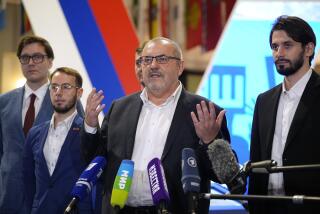Destitute Bulgarians Face Winter of Discontent
SOFIA, Bulgaria â Stefka Yanchev was plastering campaign posters on a cluttered wall the other day, but the subject of her loyalty will not appear on this weekendâs presidential ballot: Bulgariaâs exiled King Simeon II is barred from holding public office.
âNo for president, yes for the king!â declared Yanchevâs posters.
âWeâve seen what 50 years of being a republic has done for Bulgaria. A monarchy is our only hope,â Yanchev, 47, said.
The monarchists stand little chance of disrupting Sundayâs election--they are calling for a boycott--but their disaffection with the political establishment of this increasingly impoverished Balkan country is typical.
By most objective standards, Bulgaria has descended into an economic and political crisis unmatched in post-Communist Eastern Europe.
Once a fertile, breadbasket country, Bulgaria for the first time in its modern history is forced to import food this year--if it can find the money to pay for it.
The country is virtually broke, inflation is averaging 20% a month, and the value of the national currency, the lev, plummets almost daily.
Long-overdue economic reform measures are finally being taken by the Socialist government, but in the short term they will only exacerbate the pain.
Subsidies are being eased to meet the terms of an International Monetary Fund agreement, sending prices for gasoline, electricity and heating soaring beyond the reach of many residents.
The average salary has fallen below $60 a month.
In many countries, an economic disaster of this magnitude would prompt rioting in the streets.
But the concern on most Bulgariansâ minds these days is very basic: how to survive the coming winter, which threatens food shortages and psychological despair.
âBulgarians have become so poor, many are forced to choose between buying food to live or buying coal so as not to freeze to death,â opposition presidential candidate Petar Stoyanov told a rally in the northern city of Vraca last week. âIt is tragic that people are asking that kind of question at the end of the 20th century.â
*
Stoyanov, a lawyer, heads a center-right coalition, the Union of Democratic Forces, that ruled somewhat disastrously in 1993-94.
Supporters insist that they have matured and overcome divisive infighting.
In most opinion polls, which are not considered particularly reliable, Stoyanov is ahead of the ruling Socialistsâ candidate, Culture Minister Ivan Marazov, a well-respected intellectual with little political experience.
While the presidency itself is the weaker partner in a parliamentary system, the election is widely seen as a referendum on the Socialist Party--the renamed Communist Party--which controls the legislature and whose party chairman, Zhan Videnov, serves as the powerful prime minister.
Stoyanov says he hopes for a victory to set the stage for early parliamentary elections that would unseat the Socialists altogether.
But the truth is Bulgariaâs crisis is now so severe that no other government would be able to adopt austerity measures any less hurtful than those now underway.
âThe space for maneuvering is extremely limited,â said Irina Bokova, deputy foreign minister and candidate for vice president on the ruling partyâs ticket.
She described her government as a âkamikazeâ administration--suicidal because of the unpopular steps it is taking.
Bulgaria emerged from communism in 1989 with the ouster of dictator Todor Zhivkov, but it never undertook the same soul-wrenching break with Moscow as its former companions in the Soviet bloc.
*
The wild card in the presidential race is George Ganchev, until recently a U.S. citizen who in the 1970s and â80s lived in Los Angeles, where he worked as a small-bit actor and playwright. A flamboyant character, Ganchev nevertheless galvanizes a portion of the electorate looking for an alternative.
And then thereâs King Simeon II, who was deposed at age 9 in 1946 when the Communists took over Bulgaria. He visited Bulgaria for the first time in May--to huge, adoring crowds.
More to Read
Sign up for Essential California
The most important California stories and recommendations in your inbox every morning.
You may occasionally receive promotional content from the Los Angeles Times.











